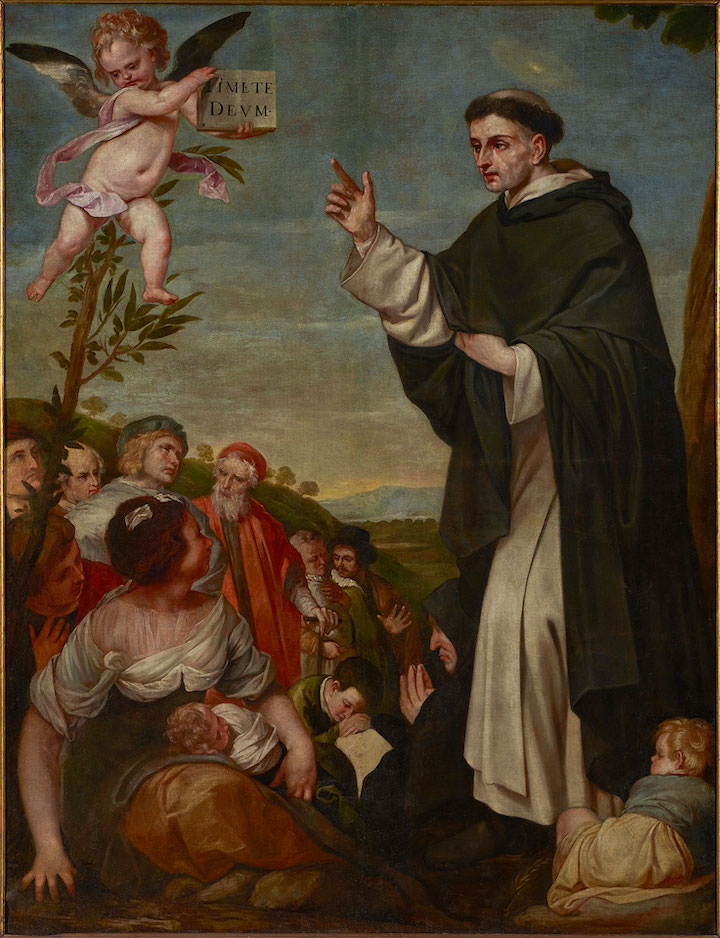Should you receive a COVID vaccine? Should you refuse? Just as we have been inundated with news of COVID for over a year, so now we (or Catholics, at least) are awash in differing and often vehement opinions about whether or not individuals can receive the vaccine in good conscience.
I will save you a repetition of the spectrum of arguments on this topic; they are easy to find online. Instead, I would like to draw attention to how a saint acted when faced with a similar situation, though it had nothing to do with a disease and everything to do with bringing wisdom to an international crisis.
Saint Vincent Ferrer was a Spanish Dominican priest who lived in the late fourteenth and early fifteenth centuries. He was also one of the most gifted and influential preachers the Church has ever known. He lived during the time of the Western Schism (1378-1418), a complex political situation with a complicated history. In brief, Vincent was a prominent Catholic leader when three separate men claimed to be the pope.
Vincent himself had supported one of them, Pedro de Luna; de Luna was his friend, and Vincent thought he would bring reform and stability to the Church. But as time passed, tensions only increased, and de Luna became hardened in his refusal to accept any negotiations that would lead to an end of the schism.
Saint Vincent recognized that the ultimate goal of every Catholic at that time should be to reunite the Church under the leadership of one (validly elected) shepherd. He realized that Pedro de Luna, though his friend, was no longer serving the good of the Church but only serving himself. Vincent, therefore, used his influence to convince other Catholic leaders to distance themselves from de Luna. In the end, all three claimants stepped down (though de Luna remained obstinate to the end) so that a new pope could be elected. All of Christendom not only heaved a sigh of relief, but acclaimed Saint Vincent as a great peacemaker.

Similarly, those of us who seek an end to abortion need to step back from the issue of vaccinations and remember our ultimate goal: to create a culture that respects the dignity of human life. In pursuit of that goal, we can follow the example of Saint Vincent.
Just as everyone in his time needed to stop arguing over which man was the legitimate pope, so we each need to stop arguing over whether we think someone else should receive the vaccine. There is plenty of information available to help individuals decide whether or not they believe it is licit, safe, and reasonable to receive a COVID vaccine. Are you convinced by those arguments that it’s a prudent decision? Then get vaccinated. Are you not convinced? Then don’t. Out of charity, we should respect one another’s free will enough to let individuals make this decision.
In Saint Vincent’s time, no one could undo the violence and confusion caused by three men claiming to be pope at the same time. The damage was done. Similarly, we cannot retroactively remove every medication from our local pharmacies that has already been tainted by involvement (though in most cases remotely) with cells from aborted children. The damage has been done. It is surely very painful to those pro-lifers who are just becoming aware that this practice has been going on, but pro-life voices have been trying to raise awareness about this matter for decades. It’s divinely ironic that a worldwide epidemic would shine light on a pro-life issue that has been ignored by our culture.
Saint Vincent would tell us that the first step is easy: repentance. Each of us as individuals can tell God we are sorry that biomedical research in our own country has been using aborted children to make medications and even offer some private act of penance. But then we can pick ourselves up, stop arguing with one another, mobilize that large body called the pro-life movement, and respectfully lift our united voices to the people who can keep this from happening again: pharmaceutical companies.
They are businesses, after all. If we can convince them that large segments of the population care about how they develop their products – and how that would affect their bottom line – we have reason to hope that they will listen. Whether individuals choose to receive the COVID vaccine or not, they can express a preference to receive vaccines that are produced in an ethical manner.
Influencing pharmaceutical companies will not be easy. But if we’re committed to protecting women and children from abortion – and I would argue we Americans have been proving ourselves to be committed to this goal since even before January 22, 1973 – the issue of vaccines is just one more way we can educate our culture about the dignity of human life.
Just two weeks ago, the USCCB launched a campaign to reach out to pharmaceutical companies that are using abortion-derived cell lines. (Read it here.) It’s only a start and would have been even better if it had come a year or more ago. But it’s a good first step. May there be many more!
*Image: St. Vincent Ferrer Preaching by Alonso Cano, 1644-45 [Santander Foundation, Madrid, Spain]














